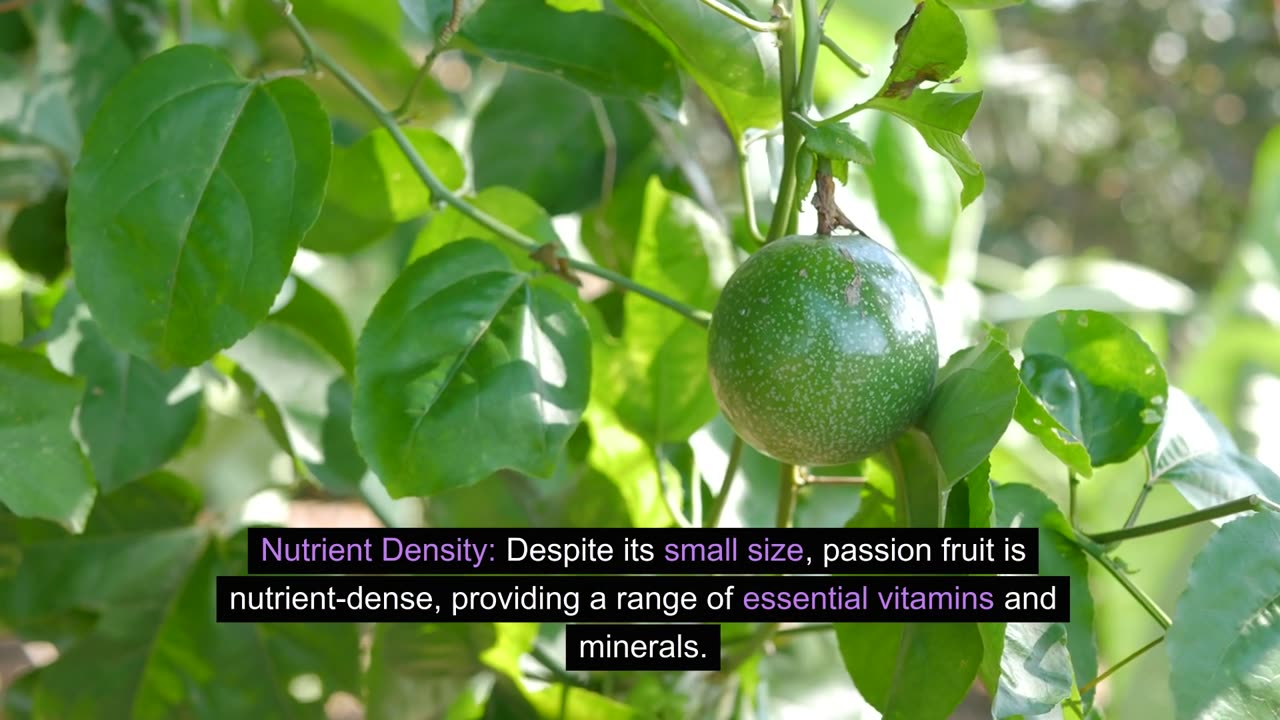Premium Only Content

Things you may not know about this exotic fruit passion fruit.
Vitamins: Passion fruit is a good source of vitamin C, vitamin A, and various B vitamins such as riboflavin (B2) and niacin (B3).
Dietary Fiber: It is high in dietary fiber, which is beneficial for digestive health.
Minerals: Passion fruit contains minerals such as potassium, iron, and copper.
Antioxidants: The fruit is rich in antioxidants, including carotenoids and polyphenols, which help combat oxidative stress in the body.
Carbohydrates: It contains natural sugars like fructose and glucose.
Protein: While not a high-protein fruit, passion fruit does provide some protein.
Health Pros:
Rich in Antioxidants: Antioxidants in passion fruit may help protect cells from damage caused by free radicals, potentially reducing the risk of chronic diseases.
Vitamin C Boost: Passion fruit is an excellent source of vitamin C, contributing to a healthy immune system, skin health, and collagen production.
Dietary Fiber: The high fiber content supports digestive health, helps regulate blood sugar levels, and may aid in weight management.
Heart Health: Potassium in passion fruit can contribute to maintaining healthy blood pressure levels.
Iron Absorption: The vitamin C content enhances the absorption of non-heme iron from plant-based foods, making it beneficial for individuals with iron-deficiency anemia.
Low in Calories: Passion fruit is relatively low in calories, making it a healthy snack option for those watching their calorie intake.
Cons:
Natural Sugars: While the sugars in passion fruit are natural, people with certain health conditions like diabetes should monitor their intake.
Allergies: Some individuals may be allergic to passion fruit, leading to symptoms such as itching, hives, or swelling.
Acidity: The fruit's high acidity may be problematic for individuals with acid reflux or sensitive stomachs.
Not a Protein Source: While it provides some protein, it's not a significant source, so those with high protein needs should supplement with other protein-rich foods.
Interactions with Medications: Passion fruit may interact with certain medications, so individuals taking prescription drugs should consult their healthcare provider.
Facts:
Origin: Passion fruit is native to South America but is now grown in many tropical and subtropical regions worldwide.
Varieties: There are various varieties of passion fruit, and they can differ in taste, size, and color. Common varieties include purple, yellow, and giant passion fruit.
Versatility: Passion fruit can be consumed fresh, juiced, or used in various culinary applications, such as desserts, sauces, and beverages.
Culinary Uses: The aromatic and tangy flavor of passion fruit makes it a popular addition to fruit salads, smoothies, desserts, and cocktails.
Nutrient Density: Despite its small size, passion fruit is nutrient-dense, providing a range of essential vitamins and minerals.
-
 39:22
39:22
The Brett Cooper Show
2 days ago $4.24 earnedBieber’s Big F-You To Hollywood & Trump Gets Ratio’d Over Epstein | Episode 48
8.8K11 -
 2:41:02
2:41:02
FreshandFit
5 hours agoFormer Escort vs Trad-Wife HEATED DEBATE
199K67 -
 2:04:47
2:04:47
Inverted World Live
7 hours agoDoomsday Clouds and Mega Tsunamis
94.1K8 -
 2:29:52
2:29:52
Badlands Media
13 hours agoDevolution Power Hour Ep. 372: Trump’s “I Told You So” Arc and the Collapse They Can’t Hide
82.4K24 -
 9:34:31
9:34:31
RalliedLIVE
13 hours ago $4.53 earned10 WINS WITH THE SHOTTY BOYS
89.1K2 -
 8:14
8:14
MattMorseTV
12 hours ago $4.77 earnedBrazil just FOUND OUT.
34.8K36 -
 5:48:05
5:48:05
SpartakusLIVE
9 hours agoWZ Solos || GCX St. Jude Charity Marathon @ 8PM EST
35K -
 4:27:47
4:27:47
elwolfpr
7 hours agoThe Reaper Returns: I’m Back, Baby!
27K1 -
 3:02:07
3:02:07
TinyPandaface
6 hours agoYour FACE is a Gaming Channel! | BIRTH - Part 1
23.6K1 -
 1:49:18
1:49:18
FreshandFit
9 hours agoLauren Southern Accuses Tate Of Abuse!
64.9K72